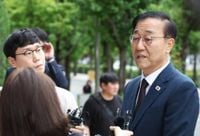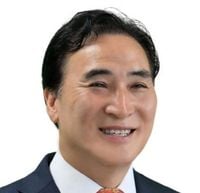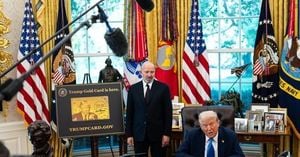Kim Yoon-deok, the nominee for South Korea's Minister of Land, Infrastructure and Transport, is navigating a complex confirmation process marked by ambitious infrastructure plans and allegations of financial irregularities involving his family. As the nation awaits his confirmation hearing scheduled for July 29, 2025, Kim's statements and controversies paint a multifaceted picture of a candidate poised to influence the country's urban development and housing policies significantly.
On July 27, 2025, Kim outlined his vision for advancing critical infrastructure projects, including the much-anticipated second relocation of public institutions and the expansion of the capital region's Metropolitan Express Railway, known as the GTX. He expressed regret over the previous administration's delays in progressing the second relocation, emphasizing his commitment to accelerating this initiative if confirmed. The first relocation, conducted between 2013 and 2015, was deemed successful, setting a precedent for the next phase aimed at promoting balanced national development.
Kim highlighted the GTX expansion as essential for improving accessibility between local regions and the capital area, thus fostering regional equity. He acknowledged concerns about the financial strain on local governments, promising to actively explore ways to alleviate their burden. This aligns with President Lee Jae-myung's earlier campaign pledges to create a '1-hour economic zone' in the capital region through GTX expansion, a cornerstone of the administration's '5 Hubs, 3 Special Zones' policy aimed at decentralizing Seoul's dominance.
In addressing Social Overhead Capital (SOC) investments, Kim stressed the importance of balancing efficiency with public interest. He advocated for restructuring or cutting back on projects with poor execution or limited impact to redirect funds toward more critical areas. Such strategic resource allocation reflects a pragmatic approach to infrastructure development amid budgetary constraints.
Kim also addressed the contentious Seoul-Yangpyeong Expressway project, currently under investigation for alleged preferential treatment involving the family of First Lady Kim Keon-hee. He emphasized the need to clarify decision-making flaws and expressed his belief that the project should resume promptly to serve public convenience and honor regional aspirations.
However, Kim's confirmation journey has been clouded by allegations of repeated asset declaration omissions related to his daughter's housing arrangements. National Assembly member Kim Jong-yang of the People Power Party brought these issues to light, scrutinizing discrepancies in the financial disclosures submitted by Kim Yoon-deok and his family.
According to Kim Jong-yang, Kim's daughter secured a 550 million won (approximately $460,000) jeonse contract—a lease system based on a large deposit rather than monthly rent—for an apartment in Seoul in 2022. Yet, she reportedly only obtained a 100 million won loan from a financial institution, leaving the source of the remaining 450 million won unclear. The nominee's 2023 asset declarations failed to account for substantial funds that Kim and his spouse allegedly mobilized through various channels, such as lease terminations and private loans, to support their daughter's housing deposit.
Further discrepancies emerged in the 2025 asset declarations, where Kim and his daughter each reported borrowing 550 million won. Contrastingly, documents submitted to the National Assembly reveal that Kim and his spouse lent a combined total of 650 million won to their daughter through consumer loans, indicating inconsistent reporting. Questions also arose about the daughter's loan repayment capacity, given her reported income and expenses, which suggest insufficient means to cover the full repayment of the 100 million won loan within the stated timeframe.
In response, Kim Yoon-deok's confirmation hearing preparation team acknowledged past errors in asset declarations and stated that the amounts have now been accurately reported as 650 million won. They emphasized that the loans to his daughter are legally compliant, with interest being charged accordingly.
Beyond family financial matters, Kim has indicated a proactive stance on regulating foreign real estate investment in South Korea. He acknowledged that while foreign ownership of housing is not widespread, it is concentrated in the capital region and on the rise. Kim proposed reviewing tax policies from a national interest perspective, considering models from countries like the United States, Singapore, and Australia, which impose various taxes and regulations on foreign property buyers to curb speculation and market disruption.
Kim pledged to strengthen investigations into foreign real estate acquisitions, including verifying family relationships to prevent circumvention of regulations. This approach aims to enhance market stability amid concerns that foreign purchases, especially in metropolitan areas, could distort housing affordability.
On the housing supply front, Kim outlined plans to utilize non-residential lands, such as commercial sites in the 2nd and 3rd generation new towns, to increase housing availability in the capital region. Recognizing challenges like vacant commercial properties and delays in land compensation and relocation processes, he promised to expand incentives to accelerate these procedures and streamline demolition and cultural heritage surveys.
Moreover, Kim emphasized the need to simplify urban redevelopment processes, proposing measures such as simultaneous establishment of redevelopment plans and business implementation plans, alongside promoting electronic voting to expedite decision-making by residents' associations. These reforms aim to speed up housing construction and address the pressing demand for urban homes.
Innovative housing models also garnered Kim's support. He highlighted the potential of 'equity accumulation-type housing'—a scheme allowing buyers to initially acquire partial ownership and gradually build full ownership over two decades or more. This model reduces upfront financial burdens and encourages long-term residency and asset growth among first-time homeowners, contributing to housing stability and social equity.
Kim also voiced support for swiftly normalizing the Gadeokdo New Airport project, identifying it as a crucial endeavor for balanced national development. On sensitive matters like the export of precision mapping data requested by global tech firms Google and Apple, he adopted a cautious approach, underscoring national security considerations over purely economic factors.
As the confirmation hearing approaches, Kim Yoon-deok stands at a crossroads, balancing ambitious infrastructure and housing reform agendas against scrutiny over personal financial transparency. His ability to address these challenges transparently and effectively will be pivotal in shaping public confidence and the trajectory of South Korea's urban development policies in the years ahead.





